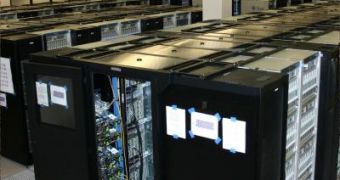The new year will bring researchers at the University of Texas' J.J. Pickle Research Campus a new toy to play with. The "Ranger" is a supercomputer built with Sun Microsystems hardware and powered by AMD quad-core chips. It is scheduled for "going live" in the first day of the next year.
The "Ranger" will be the nucleus of a national research network, called the TeraGrid, hosting more than 4,000 researchers across the country. The $59 million supercomputer will be able to perform 504 trillion operations per second, which is quite an impressive figure even for the most powerful supercomputers already in service. It is built using Sun Microsystems designed hardware and will feature no less than 15,000 quad-core processor chips from Advanced Micro Devices.
Supercomputers are currently used for what scientists refer to as "challenges": pseudo-infinite operations such as molecular movement in a suspension. The Ranger will work on complex computing problems such as earthquake prediction and simulation, or climate modeling and advanced weather forecasting.
"Ranger will enable computations science research that has been heretofore impossible, and it will provide opportunities in computer science and technology that are groundbreaking," said Juan Sanchez, vice president for research at UT.
The university officials did not disclose an estimative price for the machine, but they said the money came from the National Science Foundation, an organization that is involved with acquisition of supercomputers at universities and research laboratories across the country.
The "Ranger" is the first supercomputer built with AMD's Barcelona processors. The chip design allows it to be linked with other similar processors in order to create computing clusters. The Barcelonas were unveiled in September, but shipments were cut soon after that, because of a design flaw affecting the processor's stability. However, the "Ranger" has been patched with a piece of software in order to avoid the mentioned stability issues.
"TACC has grown into one of the leading supercomputing centers in the world because we've hired talented staff who are committed to working as a team to build something special," computing center director Jay Boisseau said .

 14 DAY TRIAL //
14 DAY TRIAL //